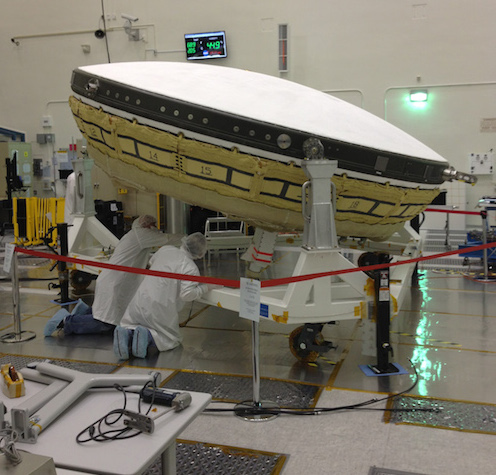NASA's Mission Mars: Flying Saucers Are Getting Ready!
NASA's engineers are developing flying saucers to ensure that we have the right technology and mechanisms to put humans on Mars. The project, officially called "Low-Density Supersonic Decelerator" (LDSD) is a flying saucer powered by rockets to allow for landing heavy payloads on the surface of Mars. The project will also allow access to much larger area on the Mars' surface by letting the flying saucers land on sites at higher altitudes. The actual test is scheduled in June and work is progressing in full swing at the US Navy's facility in Hawaii.
The biggest challenge project LDSD will try to address is to deaccelerate to the surface of the planet at a controlled speed; so that landing is safe. Engineers have traditionally used parachutes for landing but the approach has its own limitations. In order to safely land heavy payloads, rockets would need to be deployed which consume lot of fuel. Engineers are trying to utilise the natural atmospheric drag to save fuel for some other application.

The LDSD project, if successful in tests, will create a breakthrough in technology to allow carrying large payloads to the surface of Mars or any other planetary bodies that have atmosphere. The project will also ensure the technical readiness for NASA to consider future space missions to asteroids and planets in our galaxy. NASA's working with the best of the brains from the industry and academia to develop the technologies needed for the project.
One of the most important goals of the project is to ensure safe, deep-space exploration capabilities. NASA will demonstrate about seven new technical developments in the next 24 months. If everything goes as planned, the first supersonic flight tests will be conducted in 2015 and these vehicles would be ready for Mars missions by 2018.
Source: <a href="https://www.nasa.gov/mission_pages/tdm/ldsd/#.U0e52OaSzDE" target="_blank" rel="noopener noreferrer">Low-Density Supersonic Decelerator (LDSD) | NASA</a>
The biggest challenge project LDSD will try to address is to deaccelerate to the surface of the planet at a controlled speed; so that landing is safe. Engineers have traditionally used parachutes for landing but the approach has its own limitations. In order to safely land heavy payloads, rockets would need to be deployed which consume lot of fuel. Engineers are trying to utilise the natural atmospheric drag to save fuel for some other application.

The LDSD project, if successful in tests, will create a breakthrough in technology to allow carrying large payloads to the surface of Mars or any other planetary bodies that have atmosphere. The project will also ensure the technical readiness for NASA to consider future space missions to asteroids and planets in our galaxy. NASA's working with the best of the brains from the industry and academia to develop the technologies needed for the project.
One of the most important goals of the project is to ensure safe, deep-space exploration capabilities. NASA will demonstrate about seven new technical developments in the next 24 months. If everything goes as planned, the first supersonic flight tests will be conducted in 2015 and these vehicles would be ready for Mars missions by 2018.
Source: <a href="https://www.nasa.gov/mission_pages/tdm/ldsd/#.U0e52OaSzDE" target="_blank" rel="noopener noreferrer">Low-Density Supersonic Decelerator (LDSD) | NASA</a>
0
